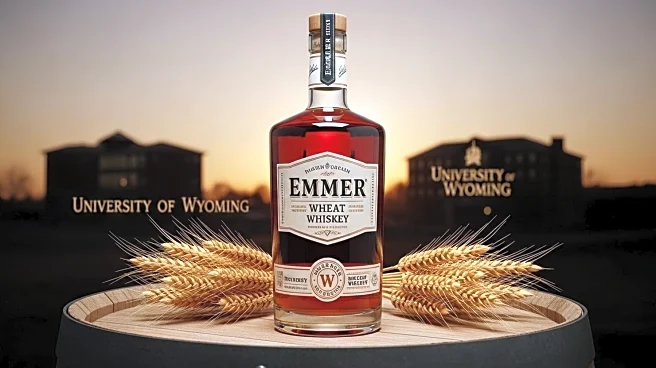What's Happening?
Dry Land Distillers, a craft distillery based in Longmont, Colorado, in collaboration with the University of Wyoming College of Agriculture, has announced the release of the first known whiskey made entirely from Emmer wheat. This initiative is part of the Wyoming First Grains Project, which began in 2018 under the Hatch Act of 1887. The project aims to create a niche industry around ancient grains, with Emmer wheat being one of the earliest domesticated grains. The whiskey, aged for 25 months in new American oak barrels, will be available starting October 18, 2025. The release is limited, with fewer than 300 bottles from the first barrel, and plans for four additional barrels over the next year.
Why It's Important?
The release of Emmer Wheat Whiskey represents a significant step in preserving and promoting ancient grains, which are part of humanity's agricultural heritage. This initiative not only supports economic development in Wyoming by creating a new market for local agriculture but also offers a unique product in the whiskey industry. The collaboration between Dry Land Distillers and the University of Wyoming highlights the potential for academic and commercial partnerships to innovate and sustain traditional agricultural practices. The whiskey's rarity and unique flavor profile could attract connoisseurs and collectors, potentially boosting tourism and local business.
What's Next?
Dry Land Distillers plans to host a launch event on October 18, 2025, where attendees can purchase the limited-edition whiskey and participate in distillery tours. The distillery aims to expand production in 2026, depending on the success of the initial release. This project could inspire similar collaborations and encourage the cultivation of other ancient grains, further diversifying the agricultural and spirits industries.
Beyond the Headlines
The project underscores the cultural and historical significance of ancient grains, offering a taste of history through modern distillation techniques. It also raises awareness about the importance of biodiversity in agriculture and the potential for ancient grains to contribute to sustainable farming practices. The success of this whiskey could lead to increased interest in other heritage grains, promoting agricultural diversity and resilience.










